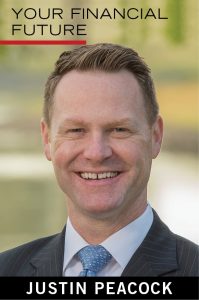Get Your Financial Life in Order, Already
What goals have you set to put yourself on more solid financial footing in the year ahead? Here are a few suggestions worth considering for lawyers, depending on where you are in the arc of your career.
January 30, 2019 at 08:00 PM
7 minute read

It's a new year, and if you're like everyone else you've made a list of some things you'd like to do better, differently, more often or less often in 2019. These resolutions typically involve eating more kale, less sugar and working out more. All great intentions and hopefully you're following through on those goals.
But what about your financial life? What goals have you set for 2019 to put yourself on more solid financial footing in the year ahead? Here are a few suggestions worth considering for lawyers, depending on where you are in the arc of your career.
 Associates. Depending on whether you're a first year or sixth year, your best next step could be very different. If you are very early in your legal career, you are likely mostly focused on paying down your law school debt. I would tend to agree with this approach, especially in light of rising interest rates which may make your law school loans more expensive. But do you have a strategy for how you are paying down your debt and how that cash outlay fits into your broader financial picture? As we start 2019, I would suggest you sit down and create a budget so you can be more strategic about what percentage of your income is going toward retiring your debt. This will also help you categorize your expenses into fixed and discretionary spending. As you get more organized perhaps you will find you are doing more discretionary spending than you thought and perhaps some of that spending could be redirected to either accelerate paying down your debt or starting to save a little bit for the future.
Associates. Depending on whether you're a first year or sixth year, your best next step could be very different. If you are very early in your legal career, you are likely mostly focused on paying down your law school debt. I would tend to agree with this approach, especially in light of rising interest rates which may make your law school loans more expensive. But do you have a strategy for how you are paying down your debt and how that cash outlay fits into your broader financial picture? As we start 2019, I would suggest you sit down and create a budget so you can be more strategic about what percentage of your income is going toward retiring your debt. This will also help you categorize your expenses into fixed and discretionary spending. As you get more organized perhaps you will find you are doing more discretionary spending than you thought and perhaps some of that spending could be redirected to either accelerate paying down your debt or starting to save a little bit for the future.
As you progress in your legal career your income is likely now trending in the traditional up-and-to-the-right pattern. So, as you start to get a little cashflow breathing room, what should you be thinking about next? Law firms are typically among the best at providing quality firm-sponsored retirement plans for their employees, usually 401(k) plans. You are still likely in your 20s, so it's important to recognize that time is very much on your side and you need to take advantage of the miracle of compound interest by increasing your participation rate in your firm's 401(k) plan. Take a look at what percentage of your income you are currently contributing to your 401(k). If you are at 5 percent, try to double it and get to 10 percent. Make it a goal to get to the point where you are maxing out your contributions by the time you make income partner.
Income partners. Income partners occupy a bit of a “land between”—you've graduated from the ranks of associate but not yet become a shareholder. Assuming that making equity partner is a major goal for you, I would suggest you use these in-between years to prepare yourself for a few important changes that will become your economic reality upon reaching equity partner status.
First, when you become an equity partner you will likely need to buy into the firm. Most firms utilize some type of credit facility either internally or through a bank to help partners make this equity buy-in payment. However, with interest rates going up, you would be wise to start saving now for that equity buy-in. If you are highly confident you are on the equity partner path, I would even consider asking your mentor if he or she could give you an idea of what it might cost for your initial equity buy-in. If you can put more cash toward the buy-in and borrow less you will save yourself some interest cost along the way. A few years ago this didn't matter as much as interest rates were hovering around 0%. However, with rates having gone up quite a bit over the last couple of years and still rising, interest costs are starting to matter more.
Next, when you become an equity partner your tax situation will get more complicated. You will begin paying your taxes differently, moving from a simple April 15thdeadline to likely making quarterly estimated tax payments on January 15th, April 15th, June 15thand September 15th. This is often a bit of a shock for newly minted equity partners because, depending on the timing of your partner distributions, you may face a cashflow crunch of needing to make a quarterly tax payment before you've received a partner distribution. Over time, this levels itself out, but in the early going it can be difficult from a cashflow standpoint. So, I would suggest starting to save up and build a cash cushion that can make those first couple of years a little less stressful when it comes time to make those quarterly tax payments.
Equity partners. You've made it to the promised land. You spent years and very long hours grinding away to make it to this point. Now that you're here what should you be doing to capitalize on what are sure to be your peak earnings years?
My number one tip for equity partners for 2019 would be to figure out “your number.” Assuming you are already maxing out all of your various firm-sponsored retirement plans what else should you be doing to put yourself on the right path to retirement security? “Your number” is the amount of after-tax savings you need to be socking away each year between now and retirement in order to give yourself a greater than 90% probability that your retirement will be financially successful. You will likely need some help to figure this out, but a good financial planner should be able to help you with it. The beauty of knowing your number is that it taps into your competitive drive as a lawyer. It gives you that clear goal that you can fixate upon and make sure you hit that savings goal each year. To make this even more actionable, I suggest looking at your partner distribution cycle and earmarking a certain amount from each distribution that will go towards your annual after-tax savings hurdle. Having a crystal-clear plan like this will make it so much more likely that you will end up on solid footing when it's time for life after the law.
A new year brings with it so much promise and the chance to make positive changes for the future. In addition to focusing on how you can be more physically healthy in 2019 utilize these few tips to get yourself more financially healthy as well.
Important Disclosure: Investments involve risk and past performance may not be indicative of future results. Balasa Dinverno Foltz LLC (BDF) investment and wealth management strategy recommendations may not be profitable, suitable or equal historical performance. BDF's current written disclosure statement discussing advisory services and fees is available for review at www.BDFLLC.com or upon request.
Justin Peacock is an owner and wealth manager at BDF, a fee-only wealth management firm based near Chicago with assets under management in excess of $4 billion. BDF serves clients nationwide and Justin provides financial planning services specifically tailored to addressing the distinct needs of lawyers. He can be reached at [email protected].
This content has been archived. It is available through our partners, LexisNexis® and Bloomberg Law.
To view this content, please continue to their sites.
Not a Lexis Subscriber?
Subscribe Now
Not a Bloomberg Law Subscriber?
Subscribe Now
NOT FOR REPRINT
© 2025 ALM Global, LLC, All Rights Reserved. Request academic re-use from www.copyright.com. All other uses, submit a request to [email protected]. For more information visit Asset & Logo Licensing.
You Might Like
View All
Avoiding the Great Gen AI Wrecking Ball: Ignore AI’s Transformative Power at Your Own Risk
6 minute read

'If the Job Is Better, You Get Better': Chief District Judge Discusses Overcoming Negative Perceptions During Q&A

'A Template' for Religious Accommodation: Attorney Gives Insight to $12M Win Over Employer's COVID-19 Vaccination Policies
Trending Stories
- 1Gunderson Dettmer Opens Atlanta Office With 3 Partners From Morris Manning
- 2Decision of the Day: Court Holds Accident with Post Driver Was 'Bizarre Occurrence,' Dismisses Action Brought Under Labor Law §240
- 3Judge Recommends Disbarment for Attorney Who Plotted to Hack Judge's Email, Phone
- 4Two Wilkinson Stekloff Associates Among Victims of DC Plane Crash
- 5Two More Victims Alleged in New Sean Combs Sex Trafficking Indictment
Who Got The Work
J. Brugh Lower of Gibbons has entered an appearance for industrial equipment supplier Devco Corporation in a pending trademark infringement lawsuit. The suit, accusing the defendant of selling knock-off Graco products, was filed Dec. 18 in New Jersey District Court by Rivkin Radler on behalf of Graco Inc. and Graco Minnesota. The case, assigned to U.S. District Judge Zahid N. Quraishi, is 3:24-cv-11294, Graco Inc. et al v. Devco Corporation.
Who Got The Work
Rebecca Maller-Stein and Kent A. Yalowitz of Arnold & Porter Kaye Scholer have entered their appearances for Hanaco Venture Capital and its executives, Lior Prosor and David Frankel, in a pending securities lawsuit. The action, filed on Dec. 24 in New York Southern District Court by Zell, Aron & Co. on behalf of Goldeneye Advisors, accuses the defendants of negligently and fraudulently managing the plaintiff's $1 million investment. The case, assigned to U.S. District Judge Vernon S. Broderick, is 1:24-cv-09918, Goldeneye Advisors, LLC v. Hanaco Venture Capital, Ltd. et al.
Who Got The Work
Attorneys from A&O Shearman has stepped in as defense counsel for Toronto-Dominion Bank and other defendants in a pending securities class action. The suit, filed Dec. 11 in New York Southern District Court by Bleichmar Fonti & Auld, accuses the defendants of concealing the bank's 'pervasive' deficiencies in regards to its compliance with the Bank Secrecy Act and the quality of its anti-money laundering controls. The case, assigned to U.S. District Judge Arun Subramanian, is 1:24-cv-09445, Gonzalez v. The Toronto-Dominion Bank et al.
Who Got The Work
Crown Castle International, a Pennsylvania company providing shared communications infrastructure, has turned to Luke D. Wolf of Gordon Rees Scully Mansukhani to fend off a pending breach-of-contract lawsuit. The court action, filed Nov. 25 in Michigan Eastern District Court by Hooper Hathaway PC on behalf of The Town Residences LLC, accuses Crown Castle of failing to transfer approximately $30,000 in utility payments from T-Mobile in breach of a roof-top lease and assignment agreement. The case, assigned to U.S. District Judge Susan K. Declercq, is 2:24-cv-13131, The Town Residences LLC v. T-Mobile US, Inc. et al.
Who Got The Work
Wilfred P. Coronato and Daniel M. Schwartz of McCarter & English have stepped in as defense counsel to Electrolux Home Products Inc. in a pending product liability lawsuit. The court action, filed Nov. 26 in New York Eastern District Court by Poulos Lopiccolo PC and Nagel Rice LLP on behalf of David Stern, alleges that the defendant's refrigerators’ drawers and shelving repeatedly break and fall apart within months after purchase. The case, assigned to U.S. District Judge Joan M. Azrack, is 2:24-cv-08204, Stern v. Electrolux Home Products, Inc.
Featured Firms
Law Offices of Gary Martin Hays & Associates, P.C.
(470) 294-1674
Law Offices of Mark E. Salomone
(857) 444-6468
Smith & Hassler
(713) 739-1250








